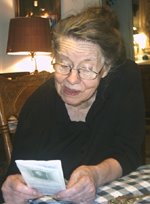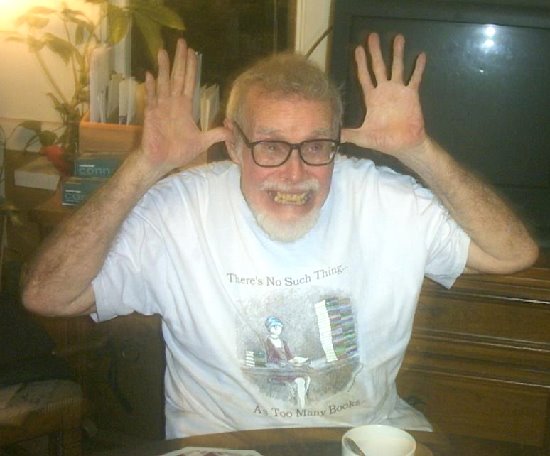It’s
been about nine months since my mother died. The tides that have turned in my
mind since then aren’t significant in themselves. At first I felt she was
watching me from above, but that lasted one afternoon. I don’t really “believe”
in an afterlife, so the sense of being spied upon faded quickly. Now I must
figure out why she DID believe, and I don’t— despite her best efforts and
prayers. Is it something I lack? Or did she lack something? Was there a void she had to fill?
 After
the first purging of junk mail and papers from the boxes in her room (my task upon my first visit to the old house after her death) I had second thoughts. Wouldn’t
it be amazing to compile a list of all the Catholic charities that had
solicited her contributions (sometimes successfully)? The list would read like
a found poem. I could still throw out the envelopes and papers, but I could write down the names of the organizations— “The Society of Saint
Gertrude the Great,” for instance. But I didn’t. My task would have
taken too long, and I was in a hurry, although I’m not sure why. I guess I
wanted to make my visit fruitful by at least eliminating all the cardboard
boxes from the room, leaving just the dresser drawers and file cabinet (also
filled with papers and junk mail).
After
the first purging of junk mail and papers from the boxes in her room (my task upon my first visit to the old house after her death) I had second thoughts. Wouldn’t
it be amazing to compile a list of all the Catholic charities that had
solicited her contributions (sometimes successfully)? The list would read like
a found poem. I could still throw out the envelopes and papers, but I could write down the names of the organizations— “The Society of Saint
Gertrude the Great,” for instance. But I didn’t. My task would have
taken too long, and I was in a hurry, although I’m not sure why. I guess I
wanted to make my visit fruitful by at least eliminating all the cardboard
boxes from the room, leaving just the dresser drawers and file cabinet (also
filled with papers and junk mail).
Then
my brother Michael came in (the one closest to me in age, who was my
pal when we were young). I gestured to papers, correspondence,
hand-written diatribes in half-filled journals about changes in the Catholic
Church. “It was her life’s work,” he said. That statement horrified me, as if I
had been throwing out my mother’s personhood. I ended up stuffing my backpack
full of the more interesting correspondence and journal entries, and bringing
it back to Alabama with me. I am thinking about writing a book.
What
I can’t get a grip on is the distance, the discrepancy, between my non-belief
and her belief. She was a person who lived every moment (apparently) wishing
and hoping that Christ and/or God (the Trinity is a puzzling doctrine) would
punish all transgressors ASAP. And transgressors included not only the usual
violators of all Ten Commandments, but priests and popes who had changed Catholic rituals she’d grown up with. In one of her writings, she is aghast
that wooden pews have been replaced with cushioned pews, and bowing substituted
for one-knee genuflection. She called it “anathema.” She abhorred change.
The 1960s was not a good time for a person like this to be raising children.
All of us must have, at various times, terrified, tortured, and deeply
disappointed her simply by being who we were, and by falling under the influence of "modernism," aka "Satan."
I
apologized to her on her deathbed (she couldn’t talk back intelligibly,
probably because of a stroke) for putting her through all that. And I thanked
her for helping me out of a few bad situations. But just as it had been at my Aunt
Josephine’s deathbed when my aunt turned to me and asked, “So, what about
religion?” I was unable to reassure either of them that I believed in God or Jesus or Mother Mary (although Mary is a pretty cool figure to
contemplate). To my aunt I could only repeat, “We really can’t know, can we?” I
don’t remember what I said to my mother, who was unable to ask. Probably nothing. But I couldn’t lie. I'd told her my views in letters. I couldn’t pretend.
Why couldn’t I at least pretend? And, digging slightly deeper, why couldn’t I actually BELIEVE?
I don’t even know whether I’m GLAD that I cannot believe, or profoundly sad
about myself in that respect.
So
many people believe, or say they do. However, I've not met anyone who believed like my mother did.
My mother refused to attend my brother’s wedding--even though it took place in
a church--because it wasn’t Catholic (neither was his bride). My
mother refused to allow the father of my sister’s children to stay in her
house, even though they’d traveled all the way from Spain to introduce her
grandchildren to her (they weren’t married at the time).
My
mother walked a multi-strand tightrope of religious principles all her life.
She welcomed suffering of all kinds (refusing to have a gallbladder operation
that would have alleviated months of ensuing pain (the gradual cessation of
which she called a “miracle” although it might have been her gallbladder simply
ceasing to function).
My mother, the good Catholic woman, refused to use birth control, and thus had many children, some of whom I'm sure neither she nor my father were ready for, emotionally or financially. My father did not share her beliefs, although he went through the motions, something for which she never forgave him; he was a deceiver.
My mother, the good Catholic woman, refused to use birth control, and thus had many children, some of whom I'm sure neither she nor my father were ready for, emotionally or financially. My father did not share her beliefs, although he went through the motions, something for which she never forgave him; he was a deceiver.
No one but a saint could have believed as firmly and deeply
as my mother did. I think she WAS aiming for sainthood of a sort. But she left me a
puzzle. And I need to solve it. I’ve
already thought of a title for my book: “Momya: The Story of a Believer and Her
Wayward Daughter.” What do you think? Catchy?



